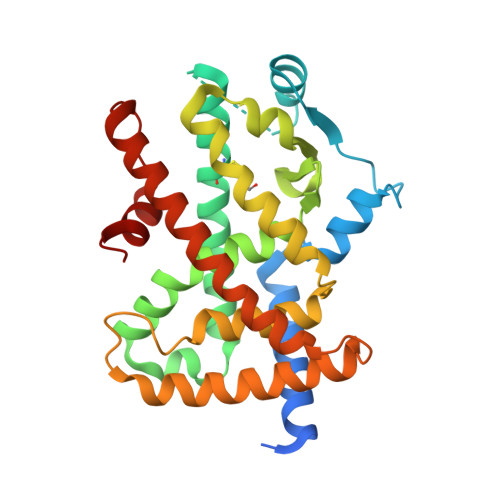Scaffold-based discovery of indeglitazar, a PPAR pan-active anti-diabetic agent
Artis, D.R., Lin, J.J., Zhang, C., Wang, W., Mehra, U., Perreault, M., Erbe, D., Krupka, H.I., England, B.P., Arnold, J., Plotnikov, A.N., Marimuthu, A., Nguyen, H., Will, S., Signaevsky, M., Kral, J., Cantwell, J., Settachatgull, C., Yan, D.S., Fong, D., Oh, A., Shi, S., Womack, P., Powell, B., Habets, G., West, B.L., Zhang, K.Y., Milburn, M.V., Vlasuk, G.P., Hirth, K.P., Nolop, K., Bollag, G., Ibrahim, P.N., Tobin, J.F.(2009) Proc Natl Acad Sci U S A 106: 262-267
- PubMed: 19116277
- DOI: https://doi.org/10.1073/pnas.0811325106
- Primary Citation of Related Structures:
3ET0, 3ET1, 3ET2, 3ET3 - PubMed Abstract:
In a search for more effective anti-diabetic treatment, we used a process coupling low-affinity biochemical screening with high-throughput co-crystallography in the design of a series of compounds that selectively modulate the activities of all three peroxisome proliferator-activated receptors (PPARs), PPARalpha, PPARgamma, and PPARdelta. Transcriptional transactivation assays were used to select compounds from this chemical series with a bias toward partial agonism toward PPARgamma, to circumvent the clinically observed side effects of full PPARgamma agonists. Co-crystallographic characterization of the lead molecule, indeglitazar, in complex with each of the 3 PPARs revealed the structural basis for its PPAR pan-activity and its partial agonistic response toward PPARgamma. Compared with full PPARgamma-agonists, indeglitazar is less potent in promoting adipocyte differentiation and only partially effective in stimulating adiponectin gene expression. Evaluation of the compound in vivo confirmed the reduced adiponectin response in animal models of obesity and diabetes while revealing strong beneficial effects on glucose, triglycerides, cholesterol, body weight, and other metabolic parameters. Indeglitazar has now progressed to Phase II clinical evaluations for Type 2 diabetes mellitus (T2DM).
- Plexxikon Inc., 91 Bolivar Drive, Berkeley, CA 94710, USA. drartis@plexxikon.com
Organizational Affiliation:



















